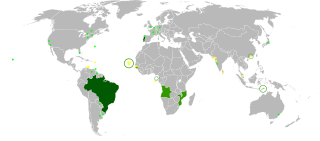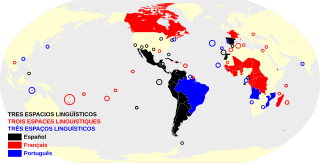 W
WThe Community of Portuguese Language Countries, also known as the Lusophone Commonwealth, is an international organization and political association of Lusophone nations across four continents, where Portuguese is an official language. The CPLP operates as a privileged, multilateral forum for the mutual cooperation of the governments, economies, non-governmental organizations, and peoples of the Lusofonia. The CPLP consists of 9 member states and 32 associate observers, located in Europe, South America, Asia, Africa and Oceania, totaling 37 countries and 4 organizations.
 W
WACOLOP, is an Olympic-related non-profit organization officially established on June 8, 2004, in Lisbon and has been approved by International Olympic Committee. It was founded by the national Olympic committees (NOCs) of Angola, Brazil, Cape Verde, East Timor, Guinea-Bissau, Macau, Mozambique, Portugal and São Tomé and Príncipe; it also includes Equatorial Guinea as an associate member. On April 2006, India and Sri Lanka were admitted also as associate members, based on their common historical past with Portugal.
 W
WThe following is a list of the 10 sovereign states and territories where Portuguese is an official language.
 W
WThe Executive Secretary of the Community of Portuguese Language Countries is the executive head and highest representative of the Community of Portuguese Language Countries (CPLP), also known as the Lusophone Commonwealth.
 W
WThe flag of the Community of Portuguese Language Countries, also known as the Flag of the Lusophony, represents the intergovernmental organization for friendship among Lusophone (Portuguese-speaking) nations where Portuguese is an official language. The Portuguese language countries are home to more than 270 million people located across the globe. The CPLP nations cover a combined area of about 10,772,000 square kilometres (4,159,000 sq mi).
 W
WThe Lusofonia Games is a multinational multi-sport event organized by the ACOLOP, which involves athletes coming from Lusophone (Portuguese-speaking) countries, most countries competing are countries that are members of the CPLP, but some are countries with significant Portuguese communities or have a history with Portugal.
 W
WThe Palace of the Counts of Penafiel, commonly known as Penafiel Palace, is a Portuguese palace located in the civil parish of Santa Maria Maior, in the municipality of Lisbon. It serves as the global headquarters of the Community of Portuguese Language Countries, also known as the Lusophone Commonwealth.
 W
WPortuguese is a Romance language originating in the Iberian Peninsula of Europe. It is the sole official language of Portugal, Angola, Mozambique, Guinea-Bissau, Cape Verde, São Tomé and Príncipe, and Brazil, while having co-official language status in East Timor, Equatorial Guinea, and Macau. A Portuguese-speaking person or nation is referred to as "Lusophone". As the result of expansion during colonial times, a cultural presence of Portuguese and Portuguese creole speakers are also found around the world. Portuguese is part of the Ibero-Romance group that evolved from several dialects of Vulgar Latin in the medieval Kingdom of Galicia and the County of Portugal, and has kept some Celtic phonology in its lexicon.
 W
WThe Portuguese-speaking African countries, also known as Lusophone Africa, consist of six African countries in which the Portuguese language is an official language: Angola, Cape Verde, Guinea-Bissau, Mozambique, São Tomé and Príncipe and, since 2011, Equatorial Guinea. The six countries are former colonies of the Portuguese Empire. From 1778 until independence, Equatorial Guinea was also a colony of the Spanish Empire.
 W
WThe Three Linguistic Spaces is a structure for cooperation between the Francophone, or French-speaking world, the Hispanophone or Spanish-speaking world, and the Lusophone, or Portuguese-speaking world. It is led by the Organization of Ibero-American States (OEI), the Community of Portuguese Language Countries (CPLP) and the International Organisation of La Francophonie (OIF).
 W
WThe University for International Integration of the Afro-Brazilian Lusophony is a public federal university located in Redenção, Ceará, Brazil. The city was chosen because it was the first Brazilian city to abolish slavery. The major courses offered are preferentially the ones included in the mutual interest of all countries in the Community of Portuguese Language Countries. They are: Brazil, Angola, Cape Verde, Guinea Bissau, Sao Tome and Principe, Mozambique, Portugal and East Timor. Looking for international integration, 50% of the seats in the University are for international students from those countries.
 W
W